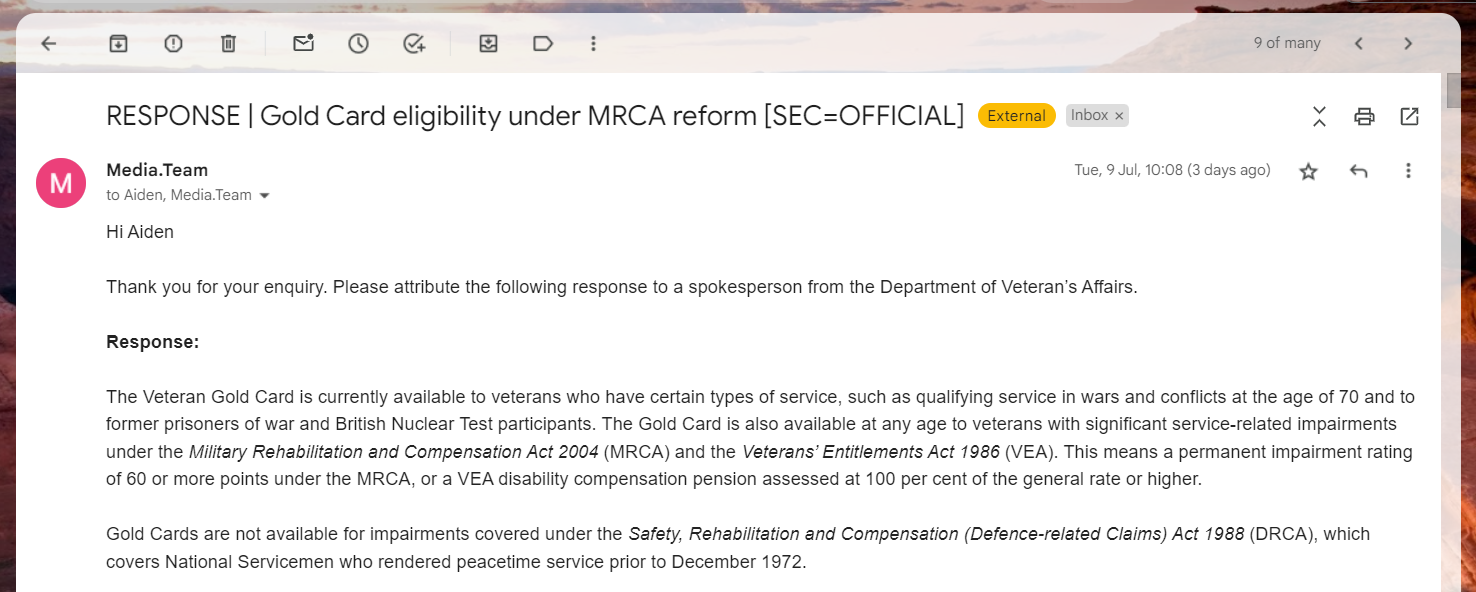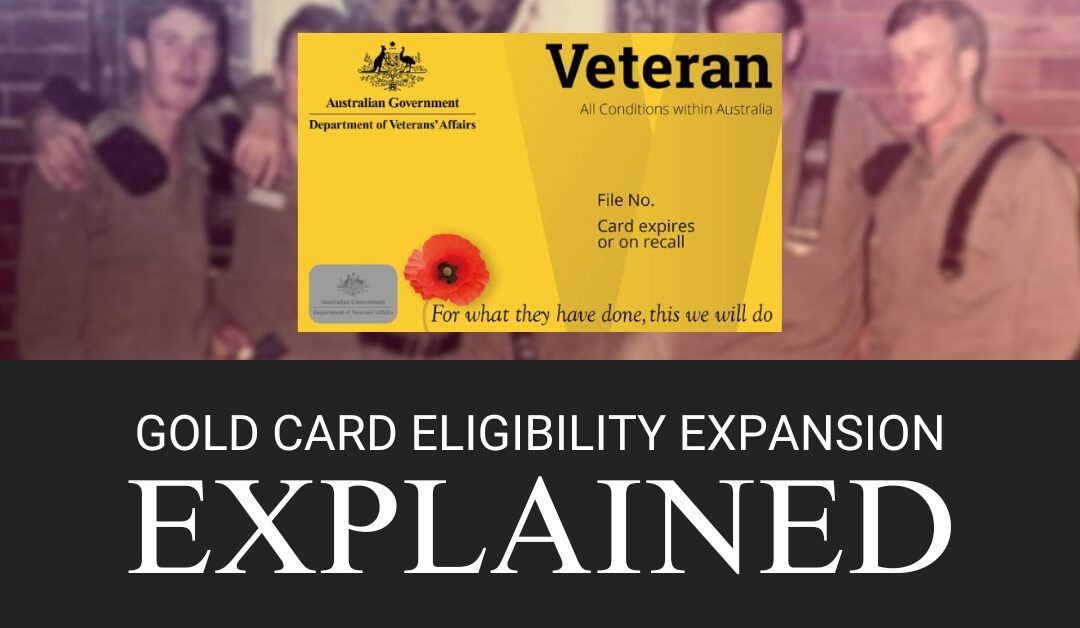Ever since the federal government started unveiling its plans for the veteran entitlement act reform, or legislative “harmonisation” as it is commonly referred to, some big questions have been raised about what it will mean for Nashos.
The government insists it will benefit them, particularly in regard to offering greater Gold Card eligibility in cases where it was not previously possible.
We put some questions to the Department of Veterans’ Affairs to see how it will work. The following article starts piecing together some answers and deciphering some of the complex corporate language the government uses when talking about it.
Below you will find the DVA’s full statement about the improved Gold Card eligibility, coupled with a series of clarifications informed by our discussions with veteran advocates.
In a nutshell, while the changes could expand qualification, advocates say it is not a magic bullet solution or as extensive as many Nashos would hope, and the time it will take to implement, combined with the delays for eventual claims, could render any potential gains negligible.
As always, advocates urge Nashos to seek advice from veteran advocates to help navigate the detail and speculation. If you are struggling to find an advocate, seek guidance from Nasho Fair Go (hello@nashofairgo.com.au).
How will it work in principle? Here’s what the DVA said
STATEMENT ISSUED TUESDAY, 9 JULY 2024

STATEMENT PART 1: The Veteran Gold Card is currently available to veterans who have certain types of service, such as qualifying service in wars and conflicts at the age of 70 and to former prisoners of war and British Nuclear Test participants. The Gold Card is also available at any age to veterans with significant service-related impairments under the Military Rehabilitation and Compensation Act 2004 (MRCA) and the Veterans’ Entitlements Act 1986 (VEA). This means a permanent impairment rating of 60 or more points under the MRCA, or a VEA disability compensation pension assessed at 100 per cent of the general rate or higher.
CLARIFICATION 1: The above summary explains the system as it currently is.
STATEMENT PART 2: Gold Cards are not available for impairments covered under the Safety, Rehabilitation and Compensation (Defence-related Claims) Act 1988 (DRCA), which covers National Servicemen who rendered peacetime service prior to December 1972.
CLARIFICATION 2: To apply for a Gold Card, a veteran must register 60 or more permanent impairment points. The points are accumulated by getting recognition for a series of individual service-related conditions, amounting to permanent impairment.
Here’s the catch: claims lodged under DRCA are not currently considered as eligible impairment points for the Gold Card. Many Nashos are covered by DRCA, so the system instantly excludes a section of the veteran community from the entitlement or makes it very hard for them to build a case for it.
RSL advocate and compensation officer Garry Beven said while the new legislation could improve eligibility, veterans will still be hamstrung by existing issues with proving permanent impairment.
“The biggest problem people are going to have is the timeframe between when they served and now,” he said.
“We’re talking 50 odd years ago when they served, now, when they put in a claim there is an act of parliament that says any impairment that happened after April 7, 2007, must have had a significant contribution from their service.
“That’s going to be the biggest downfall on their claims succeeding, whereas under the new act, you’ve got to comply with the Statement of Principles and may require radiological evidence.
“That [the SoPs] could work for or against someone.”
The DVA‘s magic rule is that evidence must show when a condition first began. Nasho Fair Go says this is incredibly hard to fulfil for older veterans whose military and medical records are either inaccurate, incomplete or nonexistent, so they are unable to identify a condition’s first exposure point.
Nasho Fair Go President Geoff Parkes says this highlights their need for a less onerous burden of proof, such as material contribution instead of significant contribution.
STATEMENT PART 3: Under the proposed simplification and harmonisation of veterans’ legislation, subject to passage of legislation, future claims for compensation for all veterans, regardless of the time and nature of their service, will be covered under the Military Rehabilitation and Compensation Act 2004 (MRCA). These arrangements would commence on 1 July 2026.
CLARIFICATION 3: After 1 July 2026 (all going well), DRCA will no longer exist, meaning Nashos will be able to have their claims assessed under the new MRCA. This could unlock a new avenue to have old conditions previously assessed under DRCA accepted as permanent impairment points for the Gold Card.
STATEMENT PART 4: This means that National Servicemen who would not otherwise have been eligible for the Gold Card may gain access to this benefit if they are significantly impaired as a result of their service.
CLARIFICATION 4: Essentially, anyone who had claims assessed under DRCA will be able to apply to have them recognised as permanent impairment points for the Gold Card under the new “harmonised” act. But they would need to lodge a new claim for each condition and prove it against the Statement of Principles. The average processing time for a MRCA claim is currently 377 days, which is problematic for older veterans who could pass away before their claims are resolved, particularly in the case of the 65-72 Nashos who will be well into their 80s by then.
STATEMENT PART 5: Under the proposed simplification and harmonisation of veterans’ legislation, subject to passage of legislation, the MRCA 60 or more impairment points Gold Card eligibility category (or other categories of Gold Eligibility under the MRCA) will be extended to include persons whose injuries are accepted under the DRCA, and where they:
o have liability accepted under the MRCA for an injury or disease other than a DRCA or VEA compensable condition, or
o have an increase in their overall impairment rating of at least five points due to the worsening of their DRCA or VEA condition or a new condition.
CLARIFICATION 5: Mr Bevan strongly advises veterans to seek an advocate as each of their circumstances will have different impacts on the types of benefits they can access and how the criteria affects them. A full list of advocates can be found on the national register: https://www.advocateregister.org.au/
Mr Bevan stressed that many places will charge for their services, but veterans do not have to pay if they are only seeking general advice.

